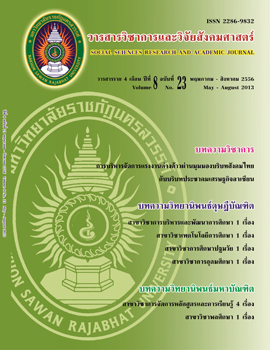การพัฒนาตัวบ่งชี้คุณภาพการจัดการศึกษาระดับดุษฎีบัณฑิต สาขาวิชาศิลปวัฒนธรรม
Main Article Content
Abstract
บทคัดย่อ
การวิจัยนี้มีวัตถุประสงค์เพื่อพัฒนาตัวบ่งชี้คุณภาพการจัดการศึกษาระดับดุษฎีบัณฑิต สาขาวิชาศิลปวัฒนธรรม ใน 3 องค์ประกอบ คือ องค์ประกอบด้านปัจจัยนำเข้า องค์ประกอบด้านกระบวนการ และองค์ประกอบด้านผลผลิต ซึ่งมีกระบวนการวิจัย 2 ขั้นตอนคือ ขั้นตอนที่ 1 การกำหนดองค์ประกอบและตัวบ่งชี้หลักของคุณภาพการจัดการศึกษา และขั้นตอนที่ 2 การตรวจสอบตัวบ่งชี้คุณภาพการจัดการศึกษา โดยกลุ่มตัวอย่างที่ใช้ในการวิจัยเป็นผู้ทรงคุณวุฒิภายนอก จำนวน 5 ท่าน คณะกรรมการบริหารหลักสูตร และนิสิตนักศึกษา ที่กำลังศึกษาอยู่ในปีการศึกษา 2555 จากมหาวิทยาลัยศรีนครินทรวิโรฒ มหาวิทยาลัยขอนแก่น และมหาวิทยาลัยมหาสารคาม ร้อยละ 82.00 เครื่องมือที่ใช้ในการวิจัย คือแบบสัมภาษณ์ และแบบสอบถาม สถิติที่ใช้ในการวิเคราะห์ข้อมูล คือ ค่าความถี่ ค่าร้อยละ ค่าคะแนนเฉลี่ย ค่าเบี่ยงเบนมาตรฐาน การทดสอบทีกับเกณฑ์
ที่กำหนด ผลการวิจัย พบว่า
1. องค์ประกอบตัวบ่งชี้คุณภาพการจัดการศึกษาระดับดุษฎีบัณฑิต สาขาวิชาศิลปวัฒนธรรม มี 3 องค์ประกอบคุณภาพ 9 ตัวบ่งชี้หลัก 171 ตัวบ่งชี้ย่อย ซึ่งองค์ประกอบด้านปัจจัยนำเข้า มี 5 ตัวบ่งชี้หลักประกอบด้วย คุณภาพของอาจารย์ 23 ตัว นิสิตนักศึกษา 18 ตัว ผู้บริหารหลักสูตร 12 ตัว หลักสูตร 19 ตัว และทรัพยากรสนับสนุนการเรียนรู้ 42 ตัว องค์ประกอบด้านกระบวนการ มี 2 ตัวบ่งชี้หลัก ประกอบด้วย กระบวนการจัดการเรียนรู้ 17 ตัว และการบริหารจัดการ 15 ตัว และองค์ประกอบด้านผลผลิต ประกอบด้วย 2 ตัวบ่งชี้หลัก ประกอบด้วย คุณภาพของดุษฎีบัณฑิต 18 ตัว และคุณภาพของปริญญานิพนธ์ 7 ตัว
2. ตัวบ่งชี้คุณภาพการจัดการศึกษาระดับดุษฎีบัณฑิต สาขาวิชาศิลปวัฒนธรรม ทั้ง 9 ตัวบ่งชี้หลัก
171 ตัวบ่งชี้ย่อย พบว่าตัวบ่งชี้ จำนวน 170 ตัว คิดเป็นร้อยละ 99.41 มีความเหมาะสมอยู่ในระดับสูงกว่าเกณฑ์ อย่างมีนัยสำคัญทางสถิติ ที่ระดับ .01 ยกเว้น 1 ตัวคือ การมีระบบการให้บริการ ข้อแนะนำเกี่ยวกับการใช้อุปกรณ์ ซึ่งอยู่ในตัวบ่งชี้คุณภาพของทรัพยากรสนับสนุนการเรียนรู้ เป็นตัวบ่งชี้ที่มีความเหมาะสมอยู่ในระดับที่ไม่สูงกว่าเกณฑ์ที่กำหนด
Abstract
The purpose of this research was to develop three components of educational management quality indicators in doctoral degree programme in Arts and Culture. There were two steps in the development of the indicators: (1) determining components and principal educational management quality indicators, and (2) examining sub indicators. The sample consisted of 5 external experts, and 82% of curriculum committees and university students who were enrolled in the doctoral degree programme in Arts and Culture at Srinakharinwirot University, Khon Kaen University, and Mahasarakham University during the academic year of 2012. The research instruments were interview forms and questionnaires. The statistical analysis were of frequency, percentages, means, standard deviations, and a one sample t- test with the determined criterion. The research findings were as follows:
1. The educational management quality indicators in doctoral degree programme in Arts and Culture consisted of 3 components, 9 principal indicators, and 171 sub-indicators as follows: The input component which consisted of 5 principal indicators and 114 sub indicators, covering 23 lecturer quality, 18 university students quality, 12 curriculum committee quality, 19 curriculum quality, and 42 supportive learning resources quality. The process component consisted of 2 principal indicators and 32 sub indicators, covering 17 process of learning management quality, and 15 administrative management quality. The output component consisted of 2 principal indicators and 25 sub indicators, covering 18 doctoral graduate characteristics quality, and 7 theses quality.
2. There were 170 out of 171 sub-indicators (equivalent to 99.41%) that were more appropriate and higher than the criteria. The service system and suggestion related equipment usage as part of supportive learning resources quality indicator was appropriate but not higher than the criteria.


